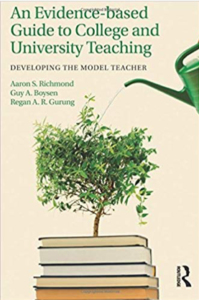by John Draeger, SUNY Buffalo State
In his most recent post, Aaron Richmond considers the possibility that promoting metacognition might be unethical (Richmond, 2018). According to Richmond, ethical teaching requires promoting student autonomy by providing students with choices between learning strategies and promoting student welfare by safeguarding against harm. Richmond believes that activities promoting student metacognition may pose a potential threat to both student welfare and student autonomy. Thus, Richmond cautiously concludes that promoting student metacognition can be unethical.
Richmond illustrates his worry by considering the use of a metacognitive strategy that he has shared on our site (Richmond, 2017), namely Immediate Feedback Assessment Techniques (IF-AT). He worries that IF-AT can cause students undue anxiety, especially if they aren’t given the option of alternative assignments. In his view, the presence of anxiety threatens welfare and the lack of options threatens autonomy. To avoid these pitfalls, Richmond recommends that instructors tell their students why and how particular teaching strategies will be used. He also recommends that instructors be on the lookout for the possibility that a particular strategy could cause unintended anxiety. And he advises that instructors should be prepared to pre-warn students about the possibility of difficulty and be prepared to debrief students afterwards if difficulties occur. These safeguards are important because they protect student welfare and autonomy. I agree, though I argue below that metacognition is key to getting there. Richmond ends by posing three questions for us to think about. He asks, “Do you believe that some IwM practices have the potential to be unethical? If so, how do you ameliorate this issue? How do I become both an ethical and metacognitive teacher?” (Richmond, 2018). I will take each question in turn.
- Do I believe that some metacognitive practices have the potential to be unethical?
In short, no. It is possible that a metacognitive assessment, such as IF-AT, could inadvertently cause serious harm to a particular student. For example, a student facing serious psychological distress outside the classroom might find an assignment, any assignment, more than she can take. But the fact that a learning strategy could inadvertently harm a particular student does not show a strategy to be unethical. By analogy, there are many medical procedures that have been studied, approved, and shown to be effective. It is always possible that one those procedures could inadvertently cause a particular patient serious harm. Doctors ought to be aware of the possibility and monitor the situation. They should be ready with remedies. But the fact that someone could be inadvertently harmed neither shows that doctors are unethical nor that the procedure should be discontinued. Likewise, if a learning strategy has been tested and shown to be effective, then it seems reasonable to try. Instructors should be aware of the possibility that some students might have an adverse reaction. But the fact that a particular student can be inadvertently harmed neither shows that instructors are unethical nor that use of the learning technique should be discontinued.
It is also possible that a well-intentioned instructor could try a teaching innovation (e.g., IF-AT) in hopes that student learning will improve only to find that it doesn’t meet that objective. There are plenty of reasons to be concerned about ineffective instruction, but being unethical is far more than being ineffective, suboptimal, or even a cause for concern. On the analogy with medicine, a particular medical procedure may not help a particular patient or even a group of patients, but it is hard to see how doctors can be unethical for trying something that they believe could work. In both cases, we hope that teachers and doctors will become aware of the problems and look to make meaningful adjustments (i.e. become more metacognitive about their practices). In contrast, it is possible that instructors could be intentionally undermining student learning efforts. Such instruction could be unethical. But I doubt this applies to instructors taking the time to design activities that promote student metacognition in hopes of enhancing student learning.
Richmond’s concern about instruction implementing metacognitive learning strategies centers on whether they harm student welfare and undermine student autonomy. Returning to his illustration, Richmond worries that students may feel coerced into doing IF-AT (thus undermining choice) and the uniqueness of the activity may cause undue anxiety (thus undermining welfare). I don’t doubt that there are plenty of assignments and activities that students don’t want to do and these may stress them out. At some level, however, students have voluntarily opted into an educational system that will make demands on their time and energy, require hard work and dedication, and push their boundaries in order to facilitate their growth. Instructors should be mindful not to make unreasonable demands, but it is unclear how providing students with immediate feedback on their performance (IF-AT) constitutes coercion or any other unethical behavior. Moreover, I have argued that instructors should promote constructive discomfort in an attempt to nudge students towards learning growth (Draeger, 2014). More specifically in regards to IF-AT, it might be that a student feels anxiety associated with students learning that they don’t know as much as they thought they knew, but I suspect that these negative feelings will be offset by the positive feelings associated with improved performance.
In short, well-meaning learning strategies, including metacognitive ones, can be ineffective and in some cases can even inadvertently cause serious harm to specific students. But I see no reason to think this shows that instruction promoting student metacognition can be unethical.
- If so, how do you ameliorate this issue?
Though I don’t think that incorporating metacognition into one’s course is unethical, I do believe that it is the key to ameliorating the sorts of concerns Richmond is worried about. For example, Richmond hopes to raise awareness about the possible unintended consequences of well-meaning pedagogical best-practices. He rightly points out that we should not assume that good-intentions will carry the day. He argues for the importance of procedural safeguards when implementing assignments, such as being explicit about the purpose of an assignment, pre-warning students about pitfalls, and debriefing students afterwards. These safeguards could help promote student welfare. He argues for the value of giving students the choice between a variety of assignments. Offering multiple entry points into content both could improve student learning and increase student autonomy. This is good advice because it is a hallmark of good teaching.
I would venture to say that Richmond’s advice is a hallmark of good teaching because it is an example of metacognitive teaching. For example, if instructors should be mindful of student anxiety and discomfort, and use that awareness to guide their pedagogical choices, then promoting metacognition is how we get there. In this case, a metacognitive instructor would become aware of a student need (e.g., reduction of anxiety) and self-regulate by making the necessary adjustments (e.g., offering alternative assignments in order to reduce that anxiety). In my view, therefore, metacognition itself is the way to ameliorate Richmond’s concerns.
- How do I become both an ethical and metacognitive teacher?
Metacognition is not a magic wand that guarantees student success. Metacognitive instruction does, however, ask instructors to become increasingly aware of what works (and what doesn’t work) with an eye towards making adjustments that are likely to improve student learning. Metacognitive instructors can monitor roadblocks to learning and help students find ways to overcome them. It is possible that an assignment, such as IF-AT, might not help a particular group of students get where they need to go. If so, then a metacognitive instructor will monitor student progress, recognize that it is not working, and intentionally make a change. The instructor might decide that the assignment should be discontinued. In this case, however, the assignment would be discontinued because it was ineffective and not because it was unethical. In my view, it is metacognitive instruction that identifies the problem and proposes a solution.
In short, if the goal is to of promote awareness of student learning needs and promote the importance of making meaningful adjustments so that student needs are met, then it seems that metacognition is the key to both student welfare and student autonomy. And if, as Richmond argues, being ethical requires promoting welfare and autonomy, then metacognition is essential to the ethical teaching.
References
Draeger, J. (2014). “Cultivating the habit of constructive discomfort.” Retrieved from https://www.improvewithmetacognition.com/cultivating-a-habit-of-constructive-discomfort/
Richmond, A. (2018). “Can metacognitive instruction be unethical?” Retrieved from https://www.improvewithmetacognition.com/can-metacognitive-instruction-be-unethical/
Richmond, A. (2017). “Scratch and win or scratch and lose? Immediate Feedback Assessment Technique.” Retrieved from https://www.improvewithmetacognition.com/scratch-win-scratch-lose-immediate-feedback-assessment-technique/



